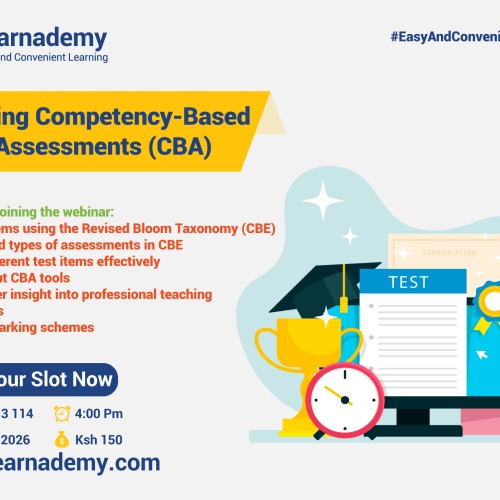-
Back
- Blog
- Browse Blogs
- Blog Post
- Get In Touch
-
Explore
- Sign up
- Login
Blog Inquiry

Kenya’s CBE Curriculum Expands: Senior School Subjects Increase From 7 to 10
12 Aug 2025 NewsThe Ministry of Education in Kenya has taken a bold step in implementing the Competency-Based Education (CBE) by expanding the number of subjects taught at the senior school level from seven to ten. This move reflects an ambitious effort to deliver a more holistic, relevant, and skills-based learning experience for Kenyan learners. It brings the country’s education system further in line with global standards that prioritize competency, flexibility, and learner-centeredness.
Among the most impactful aspects of this update is the introduction of Mathematics as a compulsory subject across all learning pathways. Regardless of whether a student is pursuing Arts, Sciences, or Social Sciences, Mathematics is now a non-negotiable part of their academic journey. The decision highlights the Ministry's commitment to ensuring that all learners acquire the foundational numeracy skills necessary for critical thinking, problem-solving, and participation in a digitally driven, data-oriented economy. Mathematics literacy has become increasingly essential not only for higher education access but also for employability in modern industries that demand technical agility.

Equally significant is the elevation of three additional subjects—Physical Education (PE), Information and Communication Technology (ICT) Skills, and Religious Instruction—to mandatory instructional status. However, these subjects will not be tested in the national assessment framework. This nuanced approach signals a transformative shift in how value is attributed to learning: recognizing that some of the most vital life skills cannot or should not be assessed through traditional exams. Physical Education, for instance, promotes health, wellness, and teamwork. ICT skills are indispensable in the 21st-century workplace, and Religious Instruction supports moral development, ethical reasoning, and cultural literacy.
This restructuring of the senior school curriculum under the Competency-Based Education is designed to foster more well-rounded learners. By moving from a narrower, test-heavy system to a broader, more balanced curriculum, students are exposed to a wider variety of disciplines, experiences, and skill sets. The goal is not just academic success, but holistic development—encompassing intellectual, physical, emotional, ethical, and technological aspects. Learners must now take responsibility for managing a more complex workload, adapting to a range of instructional strategies, and engaging meaningfully with both examinable and non-examinable subjects.
For educators, the changes bring both opportunity and responsibility. Teachers are now required to integrate formative assessments and active learning methodologies into their instruction, particularly in the subjects not covered by summative national exams. The expansion demands greater academic flexibility, collaborative planning, and continued professional development, particularly in ICT integration and cross-disciplinary teaching. Educators must facilitate learner growth not only in knowledge but in competencies, creativity, and character.

Meanwhile, parents and guardians play a pivotal role in supporting this transition. CBE is designed to be participatory, and the new subject structure demands more engagement at the household level. Parents are encouraged to take interest not only in test scores but also in their children’s broader learning journey—including physical wellness, digital literacy, and moral development. Understanding that success is no longer confined to academic achievement, families are called upon to provide emotional support, encouragement, and an environment that values all forms of learning.
This expansion of subjects is also consistent with Kenya’s broader socio-economic vision. By emphasizing digital skills, ethical education, and physical health alongside core academics, the updated CBE framework prepares learners for the realities of the global knowledge economy and local community life alike. It aligns with the goals of Kenya Vision 2030, which calls for a knowledge-based economy powered by an innovative, ethical, and well-educated workforce.
Still, the policy shift is not without challenges. Implementation will require sufficient resources—learning materials, digital infrastructure, and teacher training. Schools must be supported to make this transition smooth and effective. Stakeholders across the board must commit to making the CBE system work, appreciating that its success lies not in compliance but in shared belief and consistent execution.
Ultimately, the Ministry’s decision to expand senior school subjects and make Mathematics compulsory while recognizing the value of non-tested subjects reflects a forward-thinking approach to education. It acknowledges that the world is changing—and that learners must be equipped with not only academic knowledge but also life skills, ethical grounding, and digital fluency to thrive in it. In embracing this broader vision of education, Kenya takes another confident step toward shaping a generation that is not only exam-ready but future-ready.








